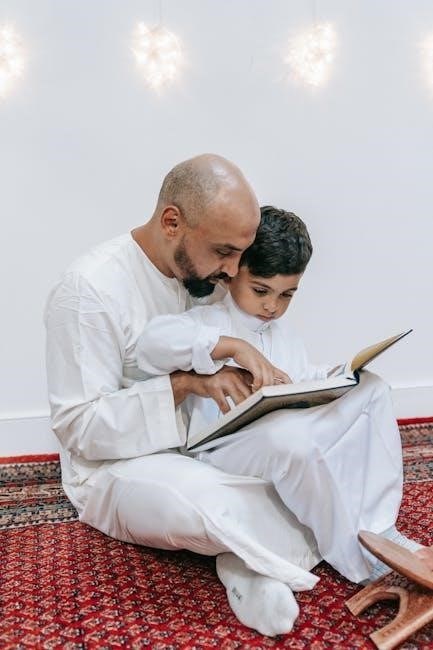
Learning Arabic in India has gained significance due to historical ties, cultural exchange, and religious studies. PDF resources and institutions like Aljamiatus Salafiah facilitate this educational pursuit.
Overview of Arabic Learning in India
Arabic learning in India has seen significant growth, driven by historical ties, religious studies, and cultural exchange. Institutions like Aljamiatus Salafiah and the University of Kerala offer comprehensive programs, while PDF resources such as Learning Arabic Language of the Quran and materials from LearnArabicOnline.com cater to diverse learning needs. These resources provide essential tools for beginners, including conversational phrases, grammar, and crash courses. Indian scholars have also contributed by developing books and online platforms to simplify Arabic learning. The integration of technology and traditional methods has made Arabic education accessible nationwide, fostering linguistic and cultural understanding. This blend of modern and classical approaches ensures Arabic learning remains vibrant and relevant in India.

Historical Background of Arabic Learning in India
Arabic learning in India began with trade and Islamic studies, flourishing in the 19th century. Indian scholars contributed significantly by preparing Arabic grammar books, aiding its spread.
Influence of Trade and Islamic Studies
The spread of Arabic in India was deeply influenced by trade and Islamic studies. Merchants and travelers introduced the language, which later became integral to religious and cultural practices. Islamic institutions played a pivotal role in promoting Arabic education, blending it with Indian traditions. This fusion enriched Indian society, fostering a unique cultural and intellectual landscape. The demand for Arabic learning grew as Indians sought to understand Islamic teachings and engage in global trade. Over time, Arabic became a bridge between India and the Arab world, facilitating cultural exchange and scholarly collaboration.

Cultural and Religious Significance of Arabic in India
Arabic holds deep cultural and religious significance in India, particularly in Islamic traditions. It is revered for Quranic studies and is integral to religious practices and scholarly works.
Role of Arabic in Education and Literature
Arabic plays a pivotal role in India’s educational and literary landscape, particularly in Islamic studies and scholars’ works. Institutions offer graduate courses, enriching linguistic expertise and cultural understanding. Literature flourishes as Indian authors blend Arabic influences, reflecting historical ties. Scholars contribute significantly by crafting books on grammar, aiding learners. PDF resources provide accessible study materials, fostering deeper engagement. This integration underscores Arabic’s enduring impact on education and literature in India, bridging cultural and academic realms effectively.
Educational Institutions and Resources for Arabic Learning
Aljamiatus Salafiah and the University of Kerala offer prominent Arabic courses, with resources like AR1431 and BA Arabic programs available as PDF study materials online.
Aljamiatus Salafiah and Other Prominent Institutions
Aljamiatus Salafiah is a renowned institution in India for Arabic learning, offering structured programs and resources. Its syllabus, available as a PDF, outlines courses like AR1431 and BA Arabic, catering to various levels. Other prominent institutions, such as the University of Kerala, provide comprehensive Arabic language programs, including complementary courses. These centers emphasize both theoretical and practical aspects of Arabic, equipping students with advanced language skills. Their resources, including PDF materials, are widely accessible, making them indispensable for learners. These institutions play a vital role in preserving and promoting Arabic education in India, ensuring its growth and adaptability in modern times.
University of Kerala’s Arabic Language Programs
The University of Kerala offers comprehensive Arabic language programs, tailored for diverse skill levels. These programs include courses under the CBCSS framework, such as BA Arabic, designed to deepen linguistic proficiency. The curriculum integrates both modern and classical aspects, ensuring a holistic understanding. PDF resources and study materials are provided to aid students in their learning journey. The university’s commitment to fostering Arabic education is evident in its structured syllabi and accessible resources, making it a pivotal institution for Arabic learners in India. These initiatives not only preserve the language’s heritage but also prepare students for future academic and professional opportunities.
PDF Resources for Learning Arabic
India offers diverse PDF resources for Arabic learning, including books, crash courses, and study materials. These are accessible via educational platforms and institutions, aiding learners effectively.
Popular PDF Books and Study Materials
Popular PDF books for learning Arabic in India include titles like Learning Arabic Language of the Quran by Izzath Uroosa, offering a comprehensive guide for beginners. Crash courses and study materials are widely available, covering essential grammar, vocabulary, and conversational phrases. Institutions like Aljamiatus Salafiah provide detailed syllabi and course materials in PDF format, such as their Complementary Course VII for BA Arabic programs. Additionally, resources like Feminine in Arabic.pdf focus on specific grammar topics, aiding learners in understanding complex concepts. These materials are often complemented by online platforms, making Arabic learning accessible and convenient for students across India.
Online Platforms Offering Arabic Learning PDFs
Several online platforms provide Arabic learning PDFs tailored for students in India. Websites like LearnArabicOnline.com offer crash courses and essential study materials, while platforms such as Eaalim Institute and Islamic Books International cater to both beginners and advanced learners. These platforms often include PDF guides on grammar, vocabulary, and conversational phrases. Some resources are designed specifically for understanding Arabic in religious contexts, such as the Quran. Additionally, platforms like Aljamiatus Salafiah and the University of Kerala share detailed syllabi and course materials online, making it easier for students to access structured learning content. These resources are complemented by live classes and interactive sessions, enhancing the learning experience.


Challenges and Opportunities in Teaching Arabic in India
Arabic learning in India faces challenges like limited resources and societal perceptions, yet opportunities arise from growing interest and scholars’ efforts to promote Arabic education effectively.
Efforts of Indian Scholars in Promoting Arabic Education
Indian scholars have significantly contributed to Arabic education by developing comprehensive resources and curriculum materials. They have authored books on Arabic grammar and vocabulary, catering to both beginners and advanced learners. Institutions like the University of Kerala and Aljamiatus Salafiah have been instrumental in offering structured Arabic programs, incorporating PDF study materials for easier access. Additionally, Indian educators have embraced digital platforms, creating engaging content for online learning. Their efforts have not only preserved the heritage of Arabic studies in India but also made it more accessible and modern, ensuring the language continues to thrive in a diverse cultural landscape.
Future Prospects for Arabic Learning in India
The future of Arabic learning in India is promising, driven by increasing interest in cultural and religious studies. Digital platforms and PDF resources are expanding accessibility, making it easier for learners to engage with the language. Educational institutions are adopting innovative teaching methods, integrating technology to enhance learning experiences. Furthermore, the growing demand for Arabic in diplomacy and international business is creating new opportunities. Collaborations between Indian scholars and global experts are expected to enrich Arabic education, ensuring its continued growth and relevance in a rapidly changing world.